Preface
In the vast silence of the cosmos, humanity’s voice has been a persistent echo, seeking meaning, reaching out for connection. This essay undertakes a voyage through humanity’s enduring quest for meaning, tracing the origins of religion intertwined with the loops of ancient myths and narratives. It delves into the cognitive and social underpinnings that have shaped religious beliefs across millennia, illustrating how evolutionary predilections and the human penchant for storytelling have collaborated to create systems of faith and understanding. From ceremonial burials to cosmic myths, this essay unravels the origin of human belief, revealing how our ancestors used myth to confront life’s great mysteries, and how these early seeds of thought blossomed into the vast religious landscapes we navigate today.
Humanity’s Search for Meaning and Connection
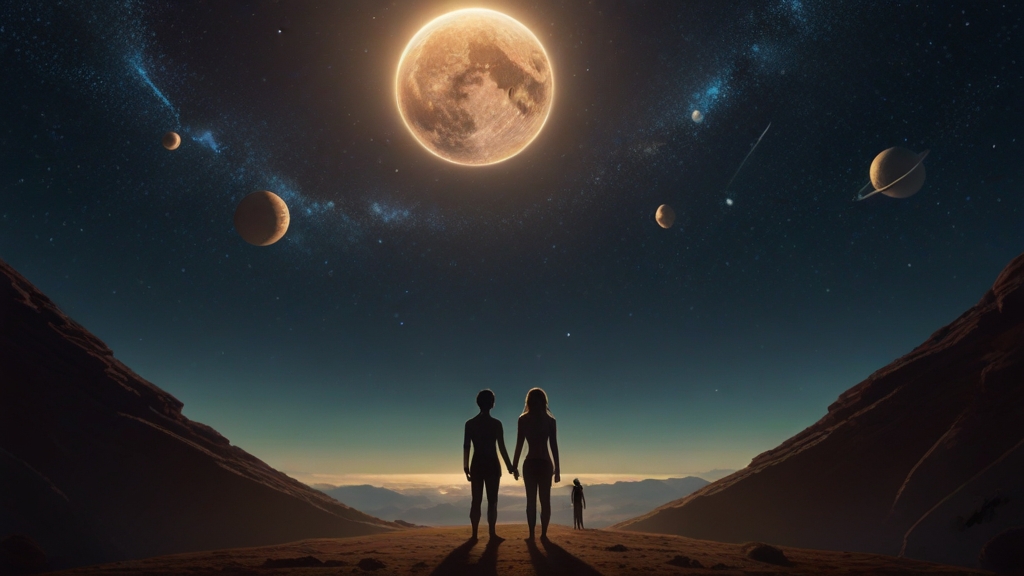
Envision a future where humanity establishes contact with intelligent life beyond Earth. These extraterrestrial beings may share tales echoing our own quest for meaning—a narrative familiar to any civilization advanced enough to gaze through telescopes, venture into space, and eavesdrop on the cosmic symphony. Such endeavors not only signify a capacity for technical skill but also reflect an innate tendency for self-reflection. The drive to explore the universe and seek understanding evolves into a profound desire to imbue our experiences with significance, prompting both practical and existential inquiries. Early human survival necessitated mastery over materials like stone, bronze, and iron and honed skills in hunting, gathering, and agriculture. Yet, beyond these survival tactics, our ancestors were compelled by the same profound questions that occupy our thoughts today: the origins and purpose of existence, and the ultimate fate of our world.
Our collective lore, steeped in enduring myths and stories, bears testament to humanity’s existential curiosity. These narratives probe the mysteries of creation, the inevitability of endings, the fleeting nature of existence, and the possibilities of other realms.
Archaeological discoveries, though fragmentary and indistinct as we peer twenty-five thousand years into the past, offer glimpses into the preoccupations of our early ancestors. The evidence of ceremonial burials, the creation of art envisioning worlds beyond our sensory experience, and the weaving of myths about divine beings, immortality, and the afterlife all hint at the nascent forms of what would evolve into organized religion. These practices, even in their rudimentary stages, reveal an acute awareness of life’s transience, weaving the acknowledgment of mortality into the fabric of early human belief and ritual.
Tracing the Cognitive Foundations of Religious Belief
Can the rise of religion throughout human history be traced back to an evolutionary foundation inherent in our brains? Advocates of the cognitive science of religion believe so, suggesting that there’s a universal evolutionary underpinning common to all forms of religious belief.
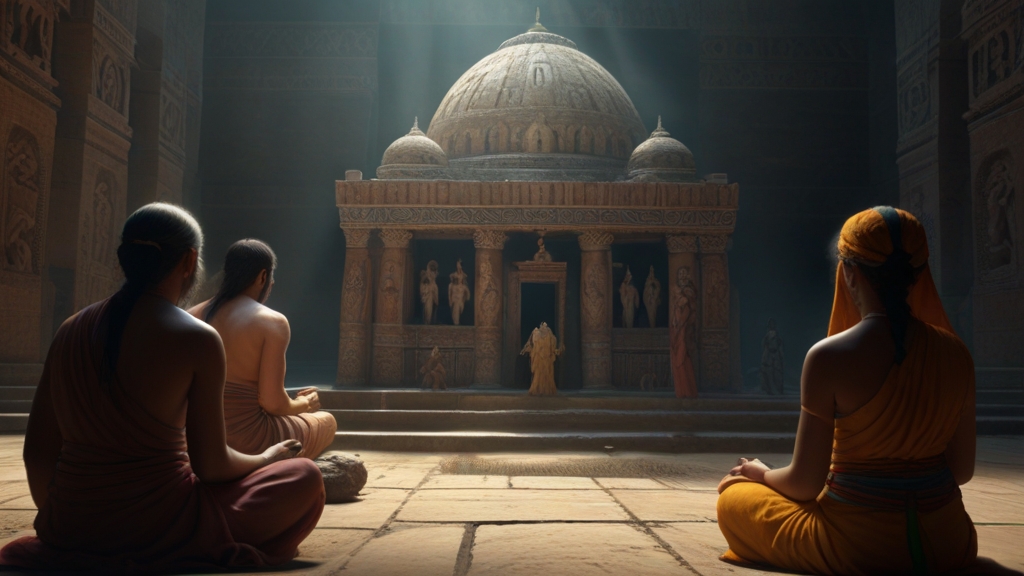
The core idea is that the human brain, through millions of years of evolution in the fierce struggle for survival, is naturally inclined towards religious belief. This isn’t to say we have specific “god genes” or “worship-wiring” in our neurons. Instead, contemporary cognitive and evolutionary psychology has shown that our brains resemble not just any computer, but a specialized one, programmed through natural selection to enhance our ancestors’ chances of survival and reproduction. This programming supports so-called “inference systems” – neural circuits finely tuned to solve the myriad challenges our forebears faced, from mastering tools to social navigation. It’s these very systems that are likely hijacked by religious thought.
One such system is our “theory of mind,” the capacity to attribute mental states to others based on our internal experiences. This instinctive skill explains why we easily populate our environment with mindful beings, whether they dwell beneath the earth or in the heavens. Similarly, our innate understanding of psychology and physics helps us navigate the world without explicit teaching. These instincts, combined with a penchant for concepts that slightly deviate from our expectations – the minimally counterintuitive – unravel the ease with which human minds gravitate towards the supernatural.
Moreover, our brains come equipped with social inference systems that monitor and manage our interactions, ensuring reciprocity and fairness. Such systems might underlie the give-and-take dynamics often observed in religious practices, where offerings and prayers are exchanged for divine favor or protection. Conversely, misfortune is frequently interpreted as a failure to satisfy these cosmic contracts.
Thus, through the lens of cognitive science, religion emerges not as an arbitrary human invention but as an almost inevitable outcome of our brain’s evolution, deeply rooted in the fundamental mechanisms that govern our perceptions, interactions, and understanding of the world.
The development of the human brain, through countless generations of survival struggles, has endowed it with traits that seem naturally receptive to religious beliefs. This inclination towards religion might not directly contribute to our survival but is a byproduct of other essential cognitive functions that were crucial for our ancestors’ survival. This complex package of cognitive abilities makes our brains especially attuned to religious ideas, ranging from the concept of deities to the supernatural. We are inherently drawn to these ideas, engage with them, and spread them, allowing religious beliefs to flourish across cultures and time.
But does this mean that the process of natural selection directly equipped our minds for religious thought? While it’s tempting to see the human penchant for religion as a straightforward result of evolutionary fitness, such a view oversimplifies the multifaceted role religion has played in human history. Religion’s ability to provide answers to existential questions about life, the universe, and death is undeniable. However, attributing the rise and characteristics of religion solely to these functions misses the broader picture. The core of the matter lies in the human mind itself, shaped by evolutionary pressures into a complex organ uniquely capable of religious thought.
Debating the origins and role of religion in human evolution is challenging, given the intricate interplay between the brain, mind, and culture. Although cognitive science of religion suggests a natural predisposition towards religious beliefs, this does not necessarily mean that religion is nothing more than an evolutionary side effect. Some scholars contend that religion’s widespread presence across diverse cultures is evidence of its significant contribution to human adaptive success.
In summary, while the evolutionary perspective provides valuable insights into why our brains might be predisposed to religious belief, it does not fully account for the multidimensional nature of religion and its enduring presence in human society. Religion, with its deep roots in the human psyche and its broad influence on human culture, may well have played a crucial role in shaping not just individual lives but the very fabric of human societies.
The Evolutionary Role of Religion in Group Cohesion
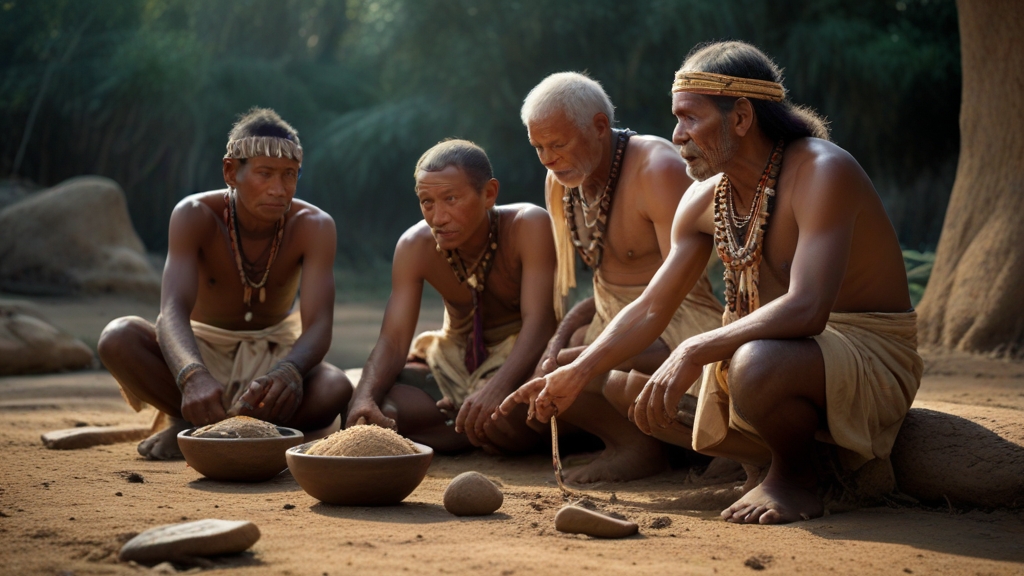
As hunter-gatherer societies expanded, they were confronted with the challenge of maintaining loyalty and cooperation within their growing clans. Darwin’s theory, further elaborated by numerous scientists over the years, suggests that natural selection effortlessly ensures this cohesion among closely related kin. Our innate loyalty to our immediate family—our siblings, children, and close relatives—is driven by the shared genetic material that enhances the probability of our genes being passed down through generations. This natural inclination towards protecting and sacrificing for one’s kin is a product of evolutionary pressures, ensuring the perpetuation of these traits in our descendants.
However, as societal groups expanded beyond immediate family ties, fostering unity and cooperation became more complex. Addressing this challenge, some evolutionary biologists, inspired by sociologist Emile Durkheim, propose that religion played a crucial role in extending the sense of kinship to larger, unrelated groups. Religion, with its rich repertory of stories, doctrines, rituals, customs, symbols, art, and behavioral standards, creates a sacred bond among its followers. By imbuing these collective practices with a sense of the sacred, religion fosters a deep emotional connection among practitioners, making them feel part of a larger familial group despite the lack of genetic ties. This religious bond prompts individuals to work together and protect each other as if they were actual kin, demonstrating how religion could have been instrumental in solving the problem of maintaining social cohesion in ever-expanding human communities.
Cooperation has been a critical factor in human evolution. Our species’ ability to collaborate, share responsibilities, and address the collective’s needs has been a key to our success. This is particularly evident in groups with strong religious ties, where shared beliefs have fostered deeper social bonds, making these groups more cohesive and resilient in the face of adversity. This phenomenon suggests that religious affiliation has played a significant adaptive role in human history.
However, this view has sparked considerable debate among researchers. Some skeptics argue that citing group cohesion as an evolutionary strategy is an oversimplified explanation for complex social behaviors. They point out that within any cooperative group, there’s a risk of selfish individuals exploiting the goodwill of others for personal gain. Such behavior could potentially lead to the collapse of cooperative systems and the extinction of pro-social traits, including those related to religious affiliation.
Supporters of the idea that religion bolsters group cohesion counter these arguments by highlighting the dynamics of early human societies, particularly hunter-gatherers of the Pleistocene era. These groups were not insular; they frequently interacted and competed with one another. In this context, groups with strong internal cooperation, often cemented by religious beliefs and practices, were more likely to survive and thrive. Devotion to shared religious principles, including reverence for ancestors and deities, could enhance group loyalty and commitment to collective wellbeing. Therefore, when considering both internal group dynamics and external pressures from intergroup competition, cooperative traits—reinforced by religious beliefs—would be more likely to spread through the population over time.
Thus, while the debate continues, it’s clear that the role of religion in fostering group cohesion is complex. It involves not just the balance of altruistic and selfish behaviors within groups but also the competitive advantages these cohesive groups may have had over their less unified counterparts. This intricate interplay of factors suggests that religion’s contribution to social cohesion may have been a significant force in human evolution.
The hypothesis that group cohesion, bolstered by religion, played a pivotal role in the survival and success of early human societies is compelling yet remains under debate. The crux of the argument hinges on whether intergroup competition or internal dynamics within groups had a more significant impact on our ancestors’ survival. Skeptics point out that the dynamics of human evolution might not be fully captured by this dichotomy. They argue that cooperative behavior can also be explained through more tangible concepts such as game theory, which suggests a spectrum of strategies between purely selfish and entirely altruistic actions. Mathematical models and simulations have shown that a strategy of reciprocal cooperation—essentially, “I’ll treat you as you treat me”—often outperforms others, indicating that cooperation can naturally evolve without the necessity of shared religious beliefs.
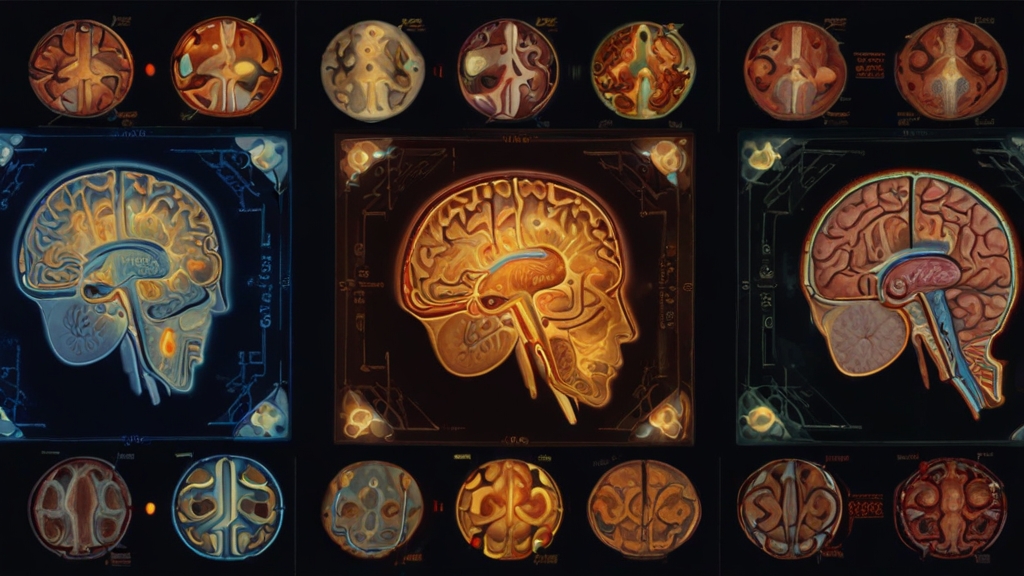
This ongoing debate underscores the complexity of determining religion’s role in ancient human societies. Religion, with its captivating stories, ritualistic comforts, and communal security, forms a multifaceted aspect of human culture that emerged from conditions so ancient and undocumented that definitive conclusions remain elusive. Moreover, some researchers propose that focusing solely on group dynamics overlooks how religion may have primarily influenced individuals, suggesting that its true adaptive benefits might be more personal.
As we navigate these intricate discussions, it’s clear that religion’s origins and its role in human evolution are far from settled. The richness of religious traditions, coupled with the scant evidence from our distant past, ensures that this debate will persist. However, it’s possible that the key to understanding religion’s evolutionary significance lies in examining its impact on individual lives, not just its ability to unite groups.
Religion’s Role in Individual Adaptation
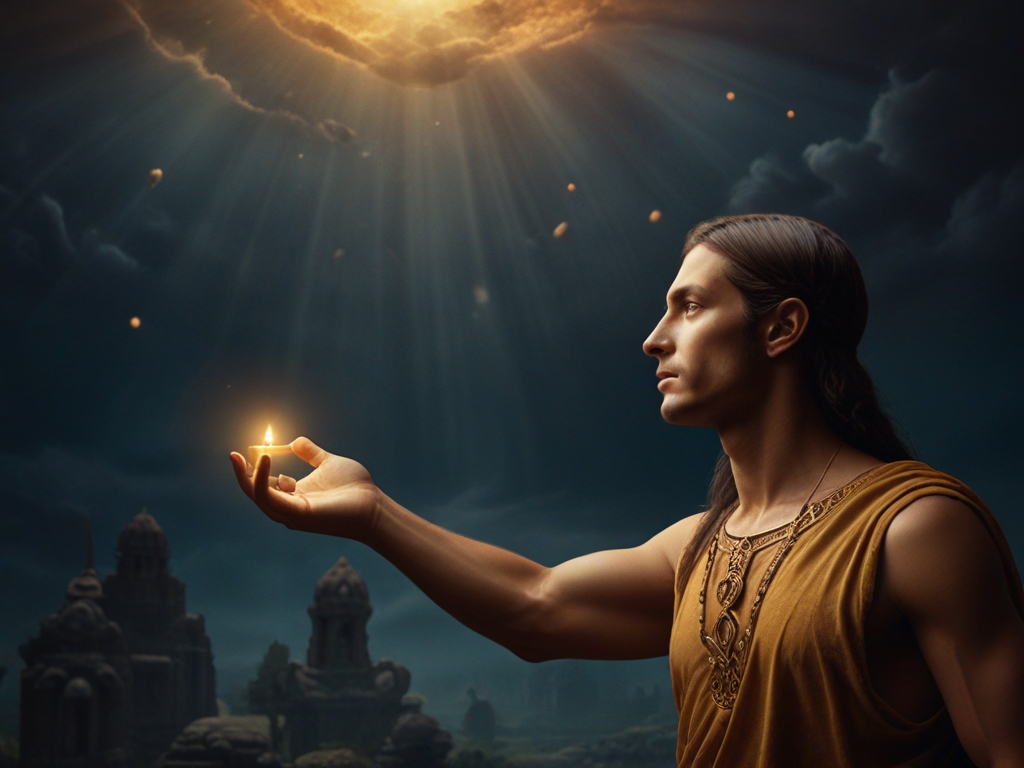
Psychologists have explored the concept that gossip may have played a crucial role in the development of religious beliefs in ancient societies. Before language, individuals could commit transgressions like theft or adultery with little risk of wide-scale reprimand, provided there were no witnesses, or the witnesses lacked social influence. However, the advent of language transformed this dynamic. Suddenly, a single widely known misdeed could ruin an individual’s reputation and diminish their chances of reproducing. Psychologist Jesse Bering suggests that the belief in an omnipresent observer could deter individuals from misbehaving, fearing divine or supernatural surveillance. This belief in an all-seeing presence would not only curb misconduct but also enhance an individual’s social standing and increase their reproductive success, embedding a religious inclination within their genetic legacy.
To support this theory, Bering conducted experiments with children, assigning them tasks to perform without adult supervision. Children informed of an invisible entity observing them were significantly less likely to break the rules than their uninformed counterparts. This experiment suggests that even from a young age, humans are naturally inclined to behave differently under the perceived watch of an unseen observer. In the context of ancient societies, this instinct may have fostered communal harmony and cooperation, promoting behaviors that aligned with societal expectations and thereby enhancing the group’s overall survival. This mechanism, over generations, could have laid the groundwork for the widespread adoption of religious beliefs, ingraining a sense of divine oversight into the fabric of human culture.
A compelling aspect of religion’s evolutionary advantage is its capacity to mitigate the existential dread of death. The idea that life extends beyond physical existence, whether literally or metaphorically, offers a profound solace against the fear of our inevitable end. Ernest Becker, in his seminal work “The Denial of Death,” eloquently argues that the human response to the awareness of mortality, through invoking the supernatural, represents a remarkable adaptation. This coping mechanism provides a sense of permanence and continuity, an assurance that defies the limitations of our material existence.
It might be difficult to picture our physically formidable ancestors on the savannah, paralyzed by existential anxiety. Yet, numerous psychosocial studies have shown that even in contemporary society awareness of our mortality profoundly influences human behavior. Research encompassing a wide range of participants, tasks, and cultural backgrounds has consistently found that mortality salience impacts everything from political choices and prejudices to artistic expression and day-to-day actions. These findings support Becker’s theory that cultural evolution has, in part, been driven by the need to buffer the psychological strain brought on by the recognition of our own mortality. Thus, if the contemplation of death seems distant or abstract to us today, it may well be because our cultural constructs, including religion, effectively shield us from the stark reality of our finitude.
Despite the variety of theories explaining the origins and persistence of religion, it’s undeniable that religious belief has offered some level of comfort and coherence to humanity. Ancient religious practices perhaps softened the harsh reality of death, weaving it into a narrative that endures and enriches daily life. William James highlighted the profound impact of religious experience by noting its ability to provide a sense of safety and peace, alongside a renewed enthusiasm for life.
The debate on why religion emerged and why it has remained a steadfast aspect of human culture is ongoing, without a clear consensus. Theories range from the adaptation of our evolved brains for group cohesion and existential reassurance to the social advantages of maintaining reputations and increasing reproductive success. Yet, the historical evidence is too fragmented to draw definitive conclusions, and religion’s multifaceted roles resist simplistic explanations. I find particular resonance in the idea that religion is closely tied to our awareness of our own mortality, as Stephen Jay Gould observed that our large brains have made us acutely aware of death, suggesting that religion may have originated from this awareness.
Our brains’ remarkable complexity enables a vast array of thoughts and actions, not all of which are directly related to survival. This huge range of behaviors underpins the diverse freedoms we cherish as humans. What remains indisputable is our enduring engagement with religion, evolving over millennia into a global network of beliefs and institutions that profoundly shape human civilization.
Conclusion
As we contemplate the cosmos, creating tales and theories to fill the void, our stories and myths are more than just a testament to our creativity; they are the bridges we build between the known and the unknown. They are our way of reaching out to the cosmos, hoping to find reflections of ourselves in the vast unknown.
As we journey through human history, from the primeval echoes of storytelling around ancient fires to mythical beliefs to the sophisticated doctrines of modern faiths, it becomes evident that religion and myth are no footnotes in humanity’s saga. They are the very essence of our quest to comprehend the universe and our place within it. This narrative is a testimony of the human spirit’s resilience, its unquenchable thirst for knowledge, and its profound need for connection—to one another, to the cosmos, and to the mysteries that lie beyond. In this journey from myths to mankind, we find not only the roots of religion but the enduring quest for meaning that defines us as a species.
Hope you enjoyed this story, a voyage across time and thought, where every discovery and tale brings us closer to understanding not just the universe, but ourselves within it.







